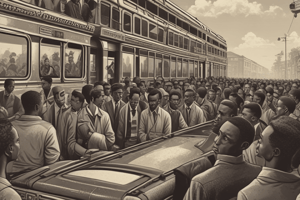Podcast
Questions and Answers
According to Thomas Aquinas, what is the role of the intellect in relation to the will?
According to Thomas Aquinas, what is the role of the intellect in relation to the will?
- Determines that the end can be achieved
- Determines the best means for the given circumstances
- Determines various means to achieve the end
- Apprehends a situation and determines that a particular end is appropriate (correct)
The concept of the will has been interpreted as a personal faculty by which philosophers?
The concept of the will has been interpreted as a personal faculty by which philosophers?
- Plato, Aristotle, Aquinas, Descartes, and Kant (correct)
- Spinoza, Leibniz, and Huma
- Sartre and Gabriel Marcel
- Jean-Paul Sartre
What is the main theme in existentialist philosophy according to the text?
What is the main theme in existentialist philosophy according to the text?
- Autonomy is not an important theme
- Participation in one’s community leads to true freedom (correct)
- Achieving autonomy in isolation from one’s community
- Conflict with others leads to true freedom
Which philosopher dubbed a group of philosophers as existentialists?
Which philosopher dubbed a group of philosophers as existentialists?
What gives human beings dignity?
What gives human beings dignity?
What does the will approve, according to Thomas Aquinas' ideas about the will and human freedom?
What does the will approve, according to Thomas Aquinas' ideas about the will and human freedom?
What does the intellect do in relation to counsel according to Thomas Aquinas' ideas about the will and human freedom?
What does the intellect do in relation to counsel according to Thomas Aquinas' ideas about the will and human freedom?
Where is true freedom or autonomy achieved according to Jean-Paul Sartre?
Where is true freedom or autonomy achieved according to Jean-Paul Sartre?
What does human freedom represent according to the text?
What does human freedom represent according to the text?
According to Thomas Aquinas' ideas about the will and human freedom, what does intellect determine?
According to Thomas Aquinas' ideas about the will and human freedom, what does intellect determine?
What is freedom according to the passage?
What is freedom according to the passage?
According to the passage, what is the will of humanity considered to be?
According to the passage, what is the will of humanity considered to be?
What does the passage suggest about moral acts?
What does the passage suggest about moral acts?
According to the passage, what is not an excuse for immoral conduct?
According to the passage, what is not an excuse for immoral conduct?
What is the responsibility of a student, as mentioned in the passage?
What is the responsibility of a student, as mentioned in the passage?
What does the passage suggest about the regret of a student who cuts class?
What does the passage suggest about the regret of a student who cuts class?
Flashcards are hidden until you start studying
Study Notes
Intellect and Will
- According to Thomas Aquinas, the intellect plays a role in presenting alternatives to the will, and the will selects one of these alternatives.
- The will approves of the alternative that is in line with the intellect's judgment.
Existentialist Philosophy
- The main theme in existentialist philosophy is that human beings have complete freedom to choose their own path in life.
- The philosopher who first dubbed a group of philosophers as existentialists was Jean-Paul Sartre.
Human Freedom and Autonomy
- Human beings achieve true freedom or autonomy when they take full responsibility for their choices and actions, according to Jean-Paul Sartre.
- Human freedom represents the ability to make choices and take responsibility for those choices.
- According to Thomas Aquinas, intellect determines the means to achieve a goal, but the will determines the goal itself.
Human Dignity and Moral Acts
- Human beings derive dignity from their ability to make choices and take responsibility for those choices.
- Moral acts are those that are in line with reason and the natural order of things.
- The passage suggests that moral acts are a result of the will's decision, not of external circumstances.
- Ignorance or external circumstances are not an excuse for immoral conduct.
Student Responsibility
- The responsibility of a student is to take full responsibility for their choices and actions, including attending classes.
- The passage suggests that a student who cuts class will likely regret their decision and may not have a valid excuse for their action.
Studying That Suits You
Use AI to generate personalized quizzes and flashcards to suit your learning preferences.




